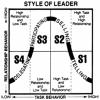One of the reasons people may demonstrate extreme emotions at work is to display passion for a cause. Anuj Magazine looks at when expressing emotions at work is acceptable, what the motivations may be, and why people don't show emotions at work.
Anuj Magazine is a software testing and general management professional at Citrix Inc. He regularly shares his knowledge and experiences as a conference speaker and writes frequently on diverse topics like software testing, management, sports, and handwriting analysis. Anuj runs ASM, a non-profit organization that contributes to society by counseling and mentoring people using the science of handwriting analysis.
All Stories by Anuj Magazine
Do you look at your IT managers as noble? Are you yourself a manager and believe you're not given the credit you deserve? Anuj Magazine shows that by spending more time mentoring, and not just managing, these IT professionals can start leading and following the true path to nobility.
Leading people and situations is not a one-size-fits-all game. Leadership styles evolve, and different situations demand the demonstration of different styles. Anuj Magazine looks at the Hersey-Blanchard Situational Leadership Theory and Strength-Based Leadership.
Google has been famous for its 20 percent time policy, but recently there has been growing speculation that this policy is kind of dying within Google. Is the organization's large size to blame? Anuj Magazine looks at some of the unique problems inherent in large organizations.
When you search Google for "software professionals," you get about 900,000 results. If you search for "software amateurs," you only get about 10,000 results. Anuj Magazine looks at the skewed focus on the word "professional" and why software amateurs may be better than software professionals.
Innovation is necessary not only for the differentiation of an organization but also for its very survival. Building a culture of innovation is a complex phenomenon and is influenced by many external factors. Does a nation's environment and culture at large influence innovation?
Can you work with someone you don't like? Given the nature of today's workplaces, we are not asked these questions before starting to work with our subordinates or bosses. In most cases, employees or managers are expected to quickly get along with the teams to which they are assigned.








